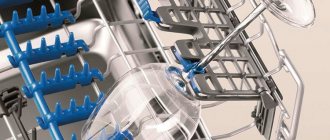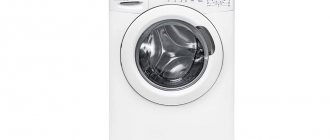The question of whether a dishwasher is needed is often heard today, regardless of how many people live in the house/apartment. Such a unit is used along with other household appliances; it has become a familiar attribute of the kitchen, so it is sometimes included in the design project of the room by default, like a microwave oven or a kettle. However, there is not always free space in the room, so you need to determine for yourself the feasibility of such a purchase.
Why do you need a dishwasher?
The main purpose of using such technology is to make life easier and provide the opportunity to do personal business instead of washing dishes. People are developing new units to save time and effort. As a result, the number of equipment increases, and it is often difficult to choose the most necessary one. A dishwasher can hold quite a lot of dishes, depending on its size. Once this technique is launched, no human intervention is required. The unit will do everything on its own: clean the dishes, dry them, and turn off when the full cycle is completed.
When the device is finished working, a person only needs to unload the dishes and put them in their places. But this is not necessary either, since such units are often started using the “Delayed Start” function. As a result, cleaning of all cookware sets may be completed later. This means you don’t need to free the machine right away. This can be done when free time appears. In this case, the device does not consume electricity, because it is turned off.
If you are wondering whether the unit saves resources (effort and time), you need to figure out what kind of work the machine does. So, if there is no such equipment in the house, then you need to wash the dishes every day, which is associated with an increase in water consumption. In addition, it will not be possible to put the devices in place right away. You need to spend time wiping down the dishes and then putting them back in place. Moreover, dry plates, glasses and other items will remain on the table until they dry. During this period, other tasks are not completed, because the person is busy washing dishes.
Under the conditions described, there is no doubt that purchasing a dishwasher will pay off.
However, if there are 2-3 people in a family or 1 man or woman lives in a house, the issue of purchasing such equipment is more acute, since the amount of dishes in these cases is much less. If some family members are often absent (at work, on a business trip), having breakfast, lunch or dinner outside the home, then PMM for a family of 2 people may not be required.
Will a dishwasher help you save on water?
We calculate in which cases it is more profitable to wash dishes by hand, and when it is better to resort to the benefits of civilization.
– There are often advertisements for dishwasher detergent on TV, in which they claim that this miracle unit will help you significantly save on water. Is this really true?
To calculate costs, the portal's editors conducted a small experiment: we compared water meter readings before and after washing dishes. Of course, the number of people in a family is different for everyone, as is the number of dishes. But there are also general points. So, in addition to a set of dishes for each family member (plate, mug, fork or spoon), there are also related items: pots, pans, their lids, cutting boards, knives, etc., and cold and hot water (for those who do not have it turned off ) are spent approximately equally.
It is also worth considering that in winter, as a rule, we use more hot water than in summer, and tariffs in different areas of the city may differ. Thus, in the Novovyatsky district the cost of a cubic meter of cold water is 33.66 rubles, in Kirov - 28.42 rubles. In addition, we do not take into account the cost of dishwashing detergents - neither for the “manual” method, nor for the dishwasher. Our calculations will only concern water costs.
To wash the dishes after dinner for a family of two, it took 35 liters of water: 18 liters of cold and 17 liters of hot. The Kirov tariff for hot water is 163.98 rubles per cubic meter, for cold water - 28.42 rubles. In addition, you need to take into account the costs of sewerage at a tariff of 21.80 rubles. per cubic meter.
Let's do the math:
0.017x163.98 + 0.018x28.42 + 0.035x21.80 = 4.06 rubles
That's how much we spent on washing two sets of dishes.
Now let's move on to dishwashers. Water consumption will depend on the model and year of its manufacture: older cars consume more water than
On this topic
Will a water heater help you save on hot water?
9866
new models, but, as a rule, costs do not exceed 20 liters, and this is in the most uneconomical option. For modern dishwashers, 6.5 liters per cycle is sufficient. In addition, the selected mode also affects water consumption: for severe pollution, an intensive mode is used, which requires more water. On average, a small dishwasher (about 45 cm wide) can fit about nine sets of dishes, and if you are willing to leave unwashed cups and plates until the evening, you can wash all the dishes that have accumulated during the day in one go.
To calculate the cost of water for a dishwasher, we took average figures: 10 liters of cold water (it is heated directly in the machine).
0.010x28.42 + 0.010x21.80 = 0.5 ruble
It turns out that a dishwasher is more than 8 times more economical than the usual “manual” method.
It’s also worth noting that our little experiment was conducted on a weekday evening. On weekends, when you have breakfast, lunch and dinner at home, a lot more dishes get dirty. Accordingly, water consumption increases.
However, this “pure” comparison did not take into account energy costs. And in the case of a dishwasher, they are significant, because it has to heat the water itself.
A small dishwasher with 6 sets consumes approximately 0.6 kWh per cycle. The electricity tariff in Kirov from July 2021 is 3.95 rubles/kWh.
0.6x3.95 = 2.37 rubles
Thus, the total cost of water and electricity per cycle for the dishwasher will be
2.37 + 0.5 = 2.87 rubles
In total, according to our calculations, it turned out that with a dishwasher we save approximately 1.69 rubles per day. However, we note once again that for the calculation we took two sets of dishes and the cost of water for washing them only once a day. In the case of a “wholesale” load of the dishwasher, the savings will be 2-3 times higher.
We also decided to calculate how long it would take for such savings to pay for a dishwasher. On the websites of Kirov household appliance stores, prices range from 15 to 130 thousand rubles (excluding all kinds of promotions and discounts). A machine worth 15 thousand will pay for itself in 8,876 washes, and the most expensive unit - in 76,924 times. If we translate this into time indicators (when calculating 2 dishes per day), it turns out that the cheapest dishwasher will pay for itself in 12 years, and the most expensive one in 105. Frankly speaking, not quickly.
Briefly about the main thing:
1. To calculate costs, we took two sets of dishes with other kitchen utensils. Only one wash per weekday was taken into account.
2. The water and electricity consumption of a dishwasher depends on its capacity and year of manufacture. Given the total costs, such equipment will not pay for itself quickly.
3. Costs directly for water with the “manual” method of washing dishes exceed the costs of a dishwasher by more than 8 times.
If you have questions that you can't find the answer to, ask us and we will try to answer them.
Photo: propositive.ru
On this topic
2783
What to do if the deadline for major home repairs is constantly being postponed?
All the pros and cons
Considering that such equipment is quite expensive (15,000-60,000 rubles), before purchasing, you should determine for yourself the pros and cons of using it. It is necessary to study the properties of the selected device, evaluate the need to use various functions that are inherent in the design. The more there are, the more expensive the machine. This means that when the purchase issue has not yet been resolved, you should consider the possibility of reducing costs by choosing a more budget-friendly model with more suitable properties.
For example, a family of 2 people needs a compact unit, maybe even a desktop machine. The same recommendation is also suitable for cases when only 1 man or woman lives in the house. For a family of 3 or more people, consider models of a compact type or standard sizes. In this case, there are more dishes, and they are used constantly. Separately, you should evaluate how often guests are in the house. If regularly, then it is better to pay attention to a standard device.
To understand whether a dishwasher is necessary, the pros and cons are studied along with reviews from the owners of such equipment. The manufacturer does not always cover all the intricacies of operation, since some points can only be learned after a long service life. Based on this information, the pros and cons of purchasing the unit are weighed.
pros
When considering the advantages, you need to take into account the practical side of the issue, and not just the information about the unit offered by the manufacturer:
- it is possible to purchase a compact device, but this is not always possible, since the dimensions of the machine directly depend on how many sets should be placed inside, for example, standard-sized models are designed for 13-16 sets;
- the choice of location is not limited in any way - this is a misconception, since the device is connected to a cold water supply, so you need to place it as close to the pipeline as possible, and to install built-in appliances, one more condition must be met - the design must correspond to the size of the niche or cabinet of the kitchen unit;
- Another advantage of a dishwasher is the economical consumption of water and electricity, however, with intensive use, costs, on the contrary, increase if the device was chosen incorrectly (the class of washing, drying, and energy efficiency is taken into account);
- the noise level is quite low (only if the value of this parameter does not exceed 45 dB);
- the quality of washing is always high - this is not entirely true, for example, if you use inappropriate products, change their dosage, or do not take into account restrictions on use, then there is a high probability that stains will appear on the dishes;
- Another advantage of a dishwasher is the presence of auxiliary functions, but they are not always needed, for example, child protection is necessary in families with a child, and protection against leaks provides the required effect if it is complete and not partial, as in some models.
Minuses
When you study reviews, you can find many disadvantages of such a technique. However, only some of the disadvantages of the dishwasher are the result of design flaws. Most problems are caused by improper handling of the device. Myths that are often mistaken for shortcomings:
- a large amount of detergent is consumed: if you follow the instructions, the costs are not so significant;
- not all dishes fit, and some items cannot be washed in a machine: if you choose the right device, then the issue of capacity is resolved quickly, another thing is the manufacturer’s ban on cleaning pots, thin glass or wood, in this case the restrictions vary;
- the unit operates for a long time, during this period water and electricity are constantly consumed: such equipment consumes much less resources than those used in manual washing.
The only significant drawback of such devices is the low quality of cleaning dishes. This may be due to a violation of the washing technology (the soaking step was skipped), the intricacies of the selected device model (only 1 rocker is installed), errors in determining a suitable detergent or calculating its sufficient dose.
Does it save water?
An analysis of the indicators of hot and cold water supply meters suggests that in one “session” of manual washing in the described mode, about 70–75 liters of hot water and 30–40 liters of cold water are spent. Of course, this amount can be reduced somewhat if you periodically open and close the water (for example, while washing dishes). However, such savings will increase the procedure time and require more effort.
We recommend: How to choose a dishwasher for your home - we talk about the pros and cons of Bosch or Electrolux
According to the instructions for the dishwasher taken as a comparison object, the consumption per cycle should be approximately 9 liters of cold water. The actual consumption (as determined by the meter) was 10 liters.
Water consumption is significantly affected by its hardness. Soft water (containing few Ca and Mg ions) washes detergents less well, so it is consumed in large quantities. At the same time, hard water shortens the life of the machine.
Calculating the cost of washing dishes in the selected modes gave the cost of one hand wash - 15.4 rubles, and machine washing - 5.5 rubles. The following tariffs were used for calculations:
- 1 cu. m of hot water including drainage – 178.19 rubles.
- 1 cu. m of cold water including drainage – 57.12 rubles.
- 1 kW of electricity during the day – 3.71 rubles. (at night the cost of 1 kW is 2.07 rubles, so if you start the car at night, one cycle will cost about 3 rubles.)
If we assume that we wash dishes in this mode once a day, then we will spend 5.5 thousand rubles on hand washing in a year. Using the machine will save almost 3.5 thousand rubles.
conclusions
To decide whether a machine is necessary, the intensity of soiling and washing of dishes is assessed. They take into account the number of people in the house, as well as the frequency of visits by friends and relatives. It is advisable to purchase a device of this type for a large family. It is also necessary to take into account the consumption of resources (electricity, water). The dishwasher does not need hot water, since the unit heats it up on its own. This does not contribute to increased costs, because the cost of the coolant for the hot water supply system is higher.
Pros and cons of a dishwasher: is it worth buying?
Hello, dear readers of the site Uspei.com. To buy or not to buy a dishwasher? If you are faced with this choice, press your thumbs up and sit back. We will analyze the pros and cons of this unit.
First minus expenses
And we’ll start with the minuses, because because of them, dishwashers are usually not bought. And the first of them is expenses . Firstly, the machine itself costs quite a bit: from five to a hundred. We also add here the costs of salt, tablets, detergent and, of course, receipts for electricity consumption .
advertising
It turns out to be a tidy sum. But no one says that you need to take the most sophisticated one - that’s it. Two - when you wash with your hands, you also use detergents. Three - modern dishwashers of class A+ and higher consume less than 1 kW per hour . And it's less than an electric kettle and a washing machine.
The second minus is chemistry
The second minus emerges from the first - chemistry . Regular dishwashing gel such as Gala or Fairy is not suitable for the dishwasher. And there is an opinion that this chemistry is oh so harmful to health.
But, let's remember that the machine washes dishes at a water temperature of 60-70 degrees and not for two minutes, if that. A minute of hand washing under running water will hardly get rid of chemicals.
And yes, the long washing time is another disadvantage. But if you have more than one set of dishes, then it is best to fill the dishwasher to the maximum in order to avoid breakdowns. Yes, you can wash it at night.
advertising
Third minus waste
Third, before placing the dishes in the machine, they need to be cleaned of food residues . Also, the machine can’t handle everything that needs to be washed. And I’m talking about plastic and wooden dishes, as well as frying pans and saucepans. And if they also have a non-stick coating , then you can’t do without a sponge and manual labor.
See also: Heated lunch box. Quickly heat up food in the car or office!
In fact: when you wash dishes in the sink, you still throw the remains of mashed potatoes, cabbage, and so on into the trash bin. But you still soak the browned frying pan and pan with soot.
The fourth disadvantage is space in the kitchen
If the kitchen is small, then finding a place for the machine will be difficult. Although, if you look at built-in or narrow models , 45 cm , then perhaps the problem can be avoided.
advertising
The fifth disadvantage is care
Yeah, the inside of the machine needs to be cleaned. And also change filters and remove contaminants . And since this is more difficult than throwing out an old sponge and replacing it with a new one, I have nothing to cover it with. These are all the cons that I managed to collect. As you can see, some of them are not so scary.
The first plus is free time
So think about it, and for now I’ll tell you about the good – the pluses. The first thing that just lies on the surface is free time . The time that is usually spent on washing dishes can be spent on family, meeting with friends, getting a manicure, your favorite TV series, and in general, on yourself.
advertising
And if you are a bachelor, then it is enough to stock up on a dozen other plates, and as the clean plates disappear, turn on the machine.
The second plus is water consumption
The second concerns water consumption. Typically, 10 minutes of manual washing of plates takes plus or minus 25 liters of water , but a dishwasher needs 15 , or even less, for the entire cycle. Now let’s estimate how many plates you will wash in 10 minutes, and how many the machine will wash in a full cycle.
Of course, you can turn on a little water pressure and lightly rinse the dishes, but are you sure that the dishes will be clean enough? We also remember that food waste can clog drains. And then the water doesn’t drain well, there are wonderful smells from the sink, mole and that’s all.
advertising
The third plus is water heating
The third one floats smoothly out of the second. When there is no hot water at home, what do you do with the dishes? Are you heating water in a kettle? Hardly. Most likely you store it in the sink. In the case of a dishwasher, you don't need hot water.
See also: Smart TV in a smart home
The machine itself heats the water to the desired temperature , and you, like a normal person, can eat from clean dishes. And when washing by hand, you need both hot and cold water. The car is just cold.
advertising
The fourth plus is heating temperature
Fourth - the temperature of the water at which the dishes are washed. As we already said – 60-70 degrees and:
- a) this allows you to get rid of even oatmeal that dried on the sides of a plate a week ago ;
- b) one-time deal with old dirt at the base of the pan handles ;
- c ) sterilizes dishes ;
- d) have you even seen what glasses look like after being washed in the dishwasher? You definitely won't be able to wash it with your hands. Well, or you need to try really hard.
The fifth plus is no queue
The fifth plus will be relevant for families where disputes continue over who will wash the dishes today. With a dishwasher, the answer will be obvious. But loading and unloading dishes is not such a time-consuming and expensive task.
The sixth plus is noiselessness
No crashing of plates, no: “Oh, she accidentally fell and broke.” You can safely load it at night without fear that it will interfere with your sleep.
The seventh plus is a dish dryer
The machine washes and dries itself , so no more puddles of water, wet towels, or rust on dish stands.
Eighth plus - manicure
And the last plus is for us girls. Nails. Still, no matter how you look at it, all these detergents do not in any way extend the life of the manicure , and if there is a mountain of dishes, then either wear gloves or don’t do the manicure. This also includes the condition of the skin of the hands .
Of course, it's up to you to decide. As for the dishwasher, it seems to me that if you have not six plates, but two sets, you often eat at home and don’t mind freeing up a little time, then this thing is needed. And washing one plate at a time is such an expensive task.
Tags: household appliances
We are on social networks:8
Features and benefits of Smeg dishwashers
All models from Smeg are distinguished by excellent performance and quality characteristics - they are easy to use, economical, reliable and practical.
In addition, Smeg introduces innovative technologies in the production of this type of equipment. For example, the HTR (High Temperature Rinse) function eliminates the possibility of cold water entering the chamber during rinsing, which makes the wash overall better. And the presence of a three-stage filtration system allows you to direct small debris into the central drum, which can be quickly and easily cleaned of dirt at the end of the operating cycle.
The equipment of dishwashers from Smeg also deserves special attention. Almost every model is equipped with two rinse aid and detergent dispensers at the same time. And some also have a built-in sensor for monitoring water hardness, adding softening salt to it if necessary and thereby protecting the heating element from scale. Most Smeg appliances come with several dishwashing cassettes of different types.
Aquastop technology
The innovative Aquastop system (to prevent flooding of the room as a result of a leak) is found in almost every modern Smeg dishwasher. The technology is based on the presence of a float sensor located under the inner chamber of the dishwasher. If water gets into the lower tray, a micro-switch is triggered, which shuts off its supply to the chamber. And an additional solenoid valve on the inlet hose stops the water supply when leaks appear in the hose itself.
Long service life
The exemplary quality and reliability of Smeg devices are widely known throughout the world. High performance is achieved through the use of only modern components, as well as through strict quality control of equipment at all stages of its production.
A responsible approach to the development and creation of household appliances, including dishwashers, allows Smeg to provide a guarantee for its products for up to 2 years. The actual service life of equipment, according to consumer estimates, is 8-10 years or more.
A large assortment
A colossal range of products from Smeg designed for washing dishes greatly simplifies the choice of both professional and household models. The company offers:
- glass washing equipment;
- dishwashers with dome and front loading;
- special models with thermal disinfection function;
- boiler washing equipment.
At the moment, the equipment of this brand is widely used both in various restaurants, bars, cafes and other catering establishments, and in everyday life. Many users choose dishwashers from Smeg for their home, not only because of the excellent technical characteristics of the device, but also due to its attractive design. The company's assortment includes models with a wide variety of designs - from classic to vintage.
Retro style models
Beautiful yet functional, retro-style Smeg dishwashers are in great demand due to their carefully thought-out, elegant design.
The color range of such models is very diverse: there are red, cream, pink, black, light green devices. Almost all of them are designed to be built into a niche; the width of the product body is 60 cm. Since the door is beautifully designed in retro style, it does not need to be covered with a furniture facade. On the contrary, it will add charm and charm to the interior of your kitchen.
The models are designed to simultaneously wash 13 standard sets of dishes. The control panel (with buttons, miniature display and LED indicators) is located on the upper end of the door and is visible only when the door is opened slightly.
Such a device will harmoniously fit into the appropriate kitchen design, emphasizing all the charm of the furnishings of the premises of the 20s-80s of the last century.











